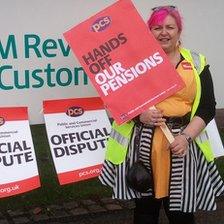Public and private sector workers react to strikes
- Published
Hundreds of thousands of public sector workers are on strike over changes to their pensions. Here people in the public and private sector share their thoughts on the action.
Wendy Turner, civil servant, Nottingham

Reforms are changing the conditions for civil servants, says Ms Turner
I'm striking because I believe that the government's plans are unfair and unnecessary. I am on the picket line today to show my support for today's strike action.
The Hutton Report showed that public sector pensions were affordable, despite what [Cabinet Office Minister Francis] Maude claims. Civil service pensions were reformed in 2007, when final-salary schemes were closed to new entrants.
The current reforms are changing the terms and conditions of civil servants in post before that date. These changes will save little money for the government but will cost workers thousands and extend their working lives by another seven-to-eight years.
We are expected to work longer but get paid less. Terms and conditions for us are changed and there is no consultation.
Langton Wildman, director of design business, Milton Keynes

Mr Wildman says the private sector has had to cut pension provision
As the owner of a private company we have had to reduce our pension contributions by 95% to ensure the company could continue trading profitably. How many members of the unions participating today have taken a similar cut?
In today's harsh climate private companies have taken the view that they can't afford to pay their employers the same sort of pensions that they used to. The public sector hasn't grasped that nettle.
I feel that the strikers don't realise they simply can't continue to receive the same pension each year when life expectancy is increasing each year; it's a question of mathematics. To have a reasonable pension you have to put more money in and possibly work longer hours.
Let's think of the country and how the UK will survive, as opposed to what pension you'll get. If Britain doesn't survive economically, then none of us will get a decent pension.
William Esson, DVLA worker, London
It is easy for [Cabinet Office Minister] Francis Maude and his ilk to attack ordinary workers. Is he on a low income and pay freeze?
I'm on a two-year pay freeze and my pension contributions have gone up £25 from last month and will continue to go up. And that's if I still have a job. The local DVLA office where I work could be closed.
My wife recently took redundancy, we have a mortgage to pay and I am struggling to pay my way.
We are not striking lightly. We cannot afford to lose pay, but we need to tell the government it's time to really listen to us. I hope the action will have an effect.
The impact on the public is unfortunate but we have no other option - we can't exactly go to Downing Street and knock on the PM's door.
Two of my adult children also work for the civil service, so I feel this is an ongoing situation, and I am fighting for them too.
Paul Lewis, commercial property consultant, London

Mr Lewis asks why public sector pensions should be protected
I am a taxpayer and have been for the past 30 years or so. I contribute from my pay to a pension to provide for my and my wife's retirement.
I'm having to contribute more, expect less and work longer than planned or anticipated. That is just the economic circumstances in which we live right now. I count myself fortunate to be in work and able to save for our pension.
My tax also pays for public-sector workers' pensions. I am happy to do that - they provide valuable services. Good luck to them. But they must also accept economic reality.
Why should their pensions - for which I am paying - be protected against the economic downturn when mine is not? The strike will turn public opinion against the public sector, which will help no-one.
The answer is to have this settled by mediation - not arbitration, but mediation.
Richard, police officer, Essex
I joined the London march in civilian clothes after my night shift. I know a lot of officers doing this after a long night shift, which highlights just how strongly we feel.
We will do our bit to save money and accept pay freezes. But why the changes to pensions? I will be nearly £400 month worse off after changes to conditions.
MPs should go think back to last year's riots. It was the police getting hurt and not seeing their families for days - or weeks - on end to end the riots. Where were politicians when petrol bombs were being chucked at officers?
Ministers should ask every victim of crime what they think about changes to policing. On a night shift there are only five officers covering an outer London borough. If your back up doesn't arrive for whatever reason you are completely on your own. There are just not enough officers.
Ian Eeglan, purchasing manager, Bradford
Public sector workers need to look at their overall package.
At one time their pay was poor and the pension made up for it, but this isn't the case any longer.
We had 13 years of rising public sector pay and employment whilst private sector pay fell in response to globalisation and outsourcing. I have seen this with my own eyes.
As a purchasing manager I travel to other countries, such as China, who make goods a lot cheaper than us. Therefore the UK outsources material, goods and work in general to other countries.
The public sector had been protected from this, but not now, and they must get used to this.
I am totally against today's public sector strikes. Public sector workers are not living in the real world.
Richard, prisoner officer, London
As a prison officer I am not able to strike.
I'm not happy with the pension changes. It is a disgrace that we should be forced to deal with the most violent and demanding members of our society up to the age of 68. Can you imagine trying to restrain a 21-year-old at that age?
For me, the changes would mean working for an extra eight years or face losing a large part of my pension.
I feel very frustrated and so do most of my colleagues. As we can't strike there's very little we can do to make our point, and so there's a sense of apathy amongst prison workers. People are almost at the point of giving up.
I fully support the strike action by public sector workers, but I don't feel the government is listening and believe they will force through the changes regardless. We've already seen strikes and they haven't made any difference.
- Published10 May 2012
- Published10 May 2012
- Published10 September 2012
- Published10 May 2012